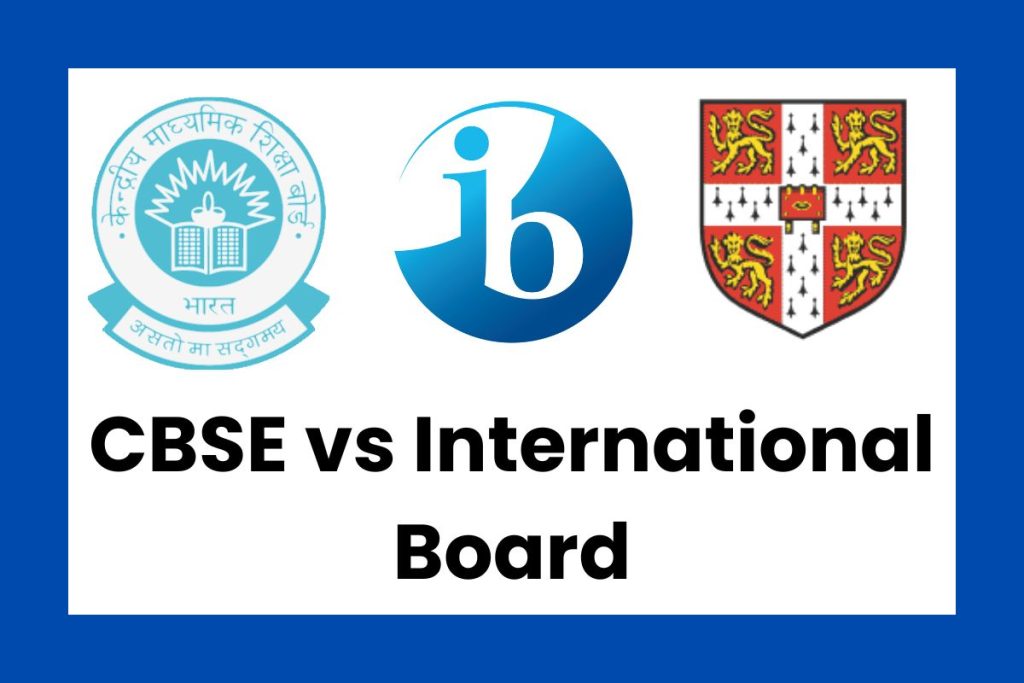CBSE vs International Board: The school admission window is usually open till the end of March. Parents contemplate a lot as they seek to get their kids admitted to schools. While the quality of faculty, school administration, activity quotient, and other factors matter a lot, one thing that also counts immensely is the educational board with which the school is affiliated. There are various educational boards in the nation with which the schools are affiliated.
The parents are often very critical of the educational boards as they are the ones deciding on the academic curriculum of the student. Different boards have distinctively prescribed syllabi. It needs to be analysed to what extent the level of various subjects matches your expectation if you are a parent. Usually, the most preferred Indian Board in the country is the Central Board of Secondary Education. There are many other boards including international ones.

There are various benefits of studying at a school affiliated with the Central Board of Secondary Education CBSE. There are different and conditional benefits of studying at the International Boards for the purpose of Education. If as a parent or potential student, you stand confused about which board to pick, the ensuing article on CBSE vs International Board. It shall help you analyse your thoughts and the specified parameter-wise details will help you with it. Read carefully and decide by considering your requirements and the catered academic facilities.
CBSE vs International Board: A Guide
As you consider CBSE vs International Board, you need to first figure out your requirements in comparison to the educational services offered by the boards. Central Board of Secondary Education is an Indian Board while the International Boards are the ones that are set up by international entities in India. While the former completely provides the academic curriculum as per the guidance of the Central Government and intends to fulfil the expectations of Indian Parents with respect to the trends in the nation.
As the name suggests, the latter follows an international curriculum and brings a twist to the education of Indian students. They mainly focus on keeping the schools up to date with the International Standard of education. Be it books, teaching criteria, and others, International Board schools are extremely different.
Before making a decision about the school, you must consider the board. In order to reach a conclusivity pertaining to the Educational Board, factors such as Curriculum, Entrance Examination, Fees, Teaching Style, and more have to be considered.
Educational Boards in India
India offers education in accordance with the National Education Policy 2020. The students have a variety of school types to choose from and their education can be from a Government, Semi-Government, or Private School. The students need to observe that the education boards are of three types, International, National, and State. The students have to make note of the following boards available to them to choose a school:
- International Board: International Baccalaureate and Cambridge Assessment International Education.
- National Board: Central Board of Secondary Education, Central Tibetan School Administration, Council for the Indian School Certificate Examinations, and National Institute of Open Schooling
- State Board: Andhra Pradesh for Secondary and Intermediate, Assam for Secondary and Higher Secondary, Bihar for School and Intermediate, Chhattisgarh, Goa, Gujarat, Haryana, Himachal Pradesh, Jammu and Kashmir, Karnataka for Secondary and Pre-University, Kerala, Madhya Pradesh, Maharashtra, Manipur for Secondary and Higher Secondary, Meghalaya, Mizoram, Nagaland, Odisha for Secondary and Higher Secondary, Punjab, Rajasthan, Tamil Nadu for Secondary and Higher Secondary, Telangana for Secondary and Intermediate, Tripura, Uttar Pradesh, Uttarakhand, and West Bengal for Primary, Secondary, Higher Secondary, Open, Vocational, and Madrasah.
What is CBSE Board?
The Central Board of Secondary Education CBSE is a national level School Education Board. It is administered and controlled by the Government of India. Prominently, all the Government Schools in the nation follow the curriculum specified by the Central Board of Secondary Education. Private Schools in India are also opting for CBSE Board gradually and most of them are affiliated with it, while others seek affiliation with International Boards and the Council of Indian School Certificate Examinations CISCE.
The Central Government governs the CBSE Board and they follow the guidelines and specifications listed by the National Council of Educational Research and Training NCERT. Not only in India, but certain schools in 28 different countries are also affiliated with CBSE Board.
What is International Board?
International Boards that are prevalent in India are founded and governed by International entities. While the National Boards in the nation move in accordance with the guidelines provided by the Indian Government, the International Boards follow their own standards and are concerned with the country to which they are more inclined. National Boards are governed by Indian Government and they are highly conscious of the Indian system and standard of Education.
Whereas, the international boards are more substantially conscious of International acceptance and they are widely spread out in distinctive countries for education. The teaching format, acceptance, and capabilities are very different and International Boards are headquartered outside India.
Read This>>> National Overseas Scholarship Scheme 2024
CBSE vs International Board Curriculum
The Education system in India prioritises theoretical knowledge considerably more than they do practical knowledge. The students have to focus on book learning and are assessed on the basis of theoretical understanding and application in order to go levels higher. The prime understanding of the students from the CBSE Board is regarding the subjects as per the interest of education within the Indian nation.
They focus more on preparing students for an education system that is more suitable for the higher education prospect in India. The syllabus prospect is strictly according to the National Council of Educational Research and Training NCERT, which the Indian Government and State Government Jobs move according to. The teachers in schools affiliated with CBSE have to fulfil Indian Criteria for teaching jobs and the teaching style, too, matters accordingly.
As compared to the National Board of CBSE, the International Boards, which are International Baccalaureate and Cambridge Assessment International Education are more concerned with the practical applicability of the education. The books are structured in a way where the education is administered in a way that the assessment explores the practical understanding of the concepts. The teaching style is very different as compared to the Indian Education System specified by the Ministry of Education. It is more about the International Standards acceptable in the Western Part of the World.
International Baccalaureate is headquartered in Geneva, Switzerland and the education system is considered and recognised as a top choice by most Undergraduate Universities across the world. The educational curriculum is highly dependent on technology and tries to keep up with modern research and technological advancements which the Indian Education system slightly lacks. The other prevalent semi-private board in India is Council for Indian School Certificate Examination CISCE, which is concerned as the toughest but internationally advanced Indian Board.
However, IB provides a little more suitable and advanced education than CISCE since the latter is also engaged in keeping up with the Indian Standards of Education while trying to build up an international standard as well.
The other prevalent international is Cambridge Assessment International Education CAIE which is headquartered in Cambridge in England. The city hosts one of the top universities in the world, which is, the University of Cambridge, England. The Department of the University of Cambridge is responsible for the management of the education prescribed to this board. Universities in the United Kingdom, the United States, many parts of Asia, Canada, Australia, and others accept education from CAIE. This board is not much in prominence in India as there have been allegations that the cultural inclination of the board is extremely orthodox that does not acters to the Indian traditionality and cultural boundaries of India.
Read This>> Scholarship After 12th 2024- Government & Private Funded Scholarship
Facts and Figures for International Board and CBSE
You must view the ensuing table to gain a perspective regarding the exploration of the International boards and CBSE in India:
| S.No. | Parameter | CBSE | IB | CAIE |
| 1. | Board Type | National | International | International |
| 2. | Headquarters | New Delhi, India | Geneva, Switzerland | Cambridge, England |
| 3. | Parent Organisation | Ministry of Education, Government of India, India | International Baccalaureate Organization | Cambridge University Press and Assessment |
| 4. | Curriculum Followed | As listed by the National Council of Educational Research and Training NCERT | Satisfying the inclusive programs: IB Diploma Programme, IB Career-related Programme, IB Middle Years Programme, and IB Primary Years Programme | As prescribed and devised by the University of Cambridge |
| 5. | Standard of Education | Indian | International | International |
| 6. | Countries | 29 including India | More than 150 countries and territories | Approximately 160 |
| 7. | Number of Schools in India | 28,526 | 205 | Nearly 400 allow education as per CAIE |
| 8. | Education Type | Highly Theoretical and Little Practical | Highly Advanced as per the International System of Education | Much depends on the advancement of the teaching standards at the University of Cambridge |
Entrance Exams Acceptance of CBSE vs International Board
Students in India have four options. They can choose to pursue higher education in India, apply for Indian Government Jobs, move out of India to study abroad, and drop education after 12th or simply get employed privately or independently. The board you are willing to choose needs to cater for your idea and your needs. While it might seem like an unnecessary contemplation, the entrance exams do have their own applicability and requirements in terms of educational boards from which a student in India has passed.
Be it the Central Board of Secondary Education CBSE, International Baccalaureate IB, or Cambridge Assessment International Education CAIE, all the boards are accepted by the Central Government of India and nearly all the Governments in the world. Thus, any examination that you apply for will accept by the boards but there is a difference which will eventually reflect as you will try to prepare for the examinations.
Suppose you are planning to pursue higher education in India. In that case, you need to observe that the competitive examinations that are conducted by the Universities approved by the University Grants Commission always make sure that they follow the curriculum followed by top Indian Institutions. If you are an engineering aspirant, you will prepare for the Government Entrance Examination which is the Joint Entrance Examination JEE. This exam has a syllabus prescribed by the NCERT which the authorities at the Central Board of Secondary Education CBSE stick very religiously to. If you are preparing to enter private colleges of engineering, the highest possibility is that they ask you for your JEE score or have their personal exams which follow the NCERT syllabus. The same applies to other Undergraduate Entrance Examinations such as the National Entrance cum Eligibility Test NEET, Common Law Admission Test CLAT, Common Admission Test CAT, and others.
For students preparing for Central or State Government Jobs straight after their Class 12th, they need to observe that the accepted syllabus that has been prescribed by the Government organisations is in accordance with the level of education that the National Council of Educational Research and Training NCERT tries to induce. Thus, aspirants must be prepared with the educational system of CBSE which entirely keeps up with the NCERT-prescribed educational system and academic curriculum.
The students preparing for SAT which happened to be the Scholastic Aptitude Test and later the Scholastic Assessment Test need to have an understanding of the International Standard of education. The students need to observe that the exam is conducted by the College Board in order to admit students in Undergraduate Programs at top universities across the world, including the Ivy League Colleges.
The students must understand that International Boards such as International Baccalaureate IB and Cambridge Assessment International Education CAIE will help them to keep up with the international levels of education and prepare well for these tests as they focus much on the international level of understanding of English and other subjects. There are other independent entrance exams other than SAT as well which the World Universities conduct as well which require the student to have a profound understanding as imparted by the International system of education.
While the students of both kinds of boards can appear for any entrance exam of national or international level, they need to consider that if the educational board, be it CBSE or International Board, does not prepare them well for the intended exam, they will have to make an extra effort to do so.
Cost of Education at CBSE and International Boards
The cost of education matters a lot. In terms of the Central Board of Secondary Education CBSE, the schools can be private or government. The private schools are not funded by the Indian Government and have a distinctively elite status where luxuries also support the education, hence they cost higher. A good private school affiliated with CBSE can cost way less than Rs. 1 Lakh for a calendar year, ranging from Rs. 50,000 per year to Rs. 80,000 annually.
The cost might go way more depending on other factors and facilities. But, Government Schools are extremely cheap as they are funded by Government and cost even less than Rs. 50,000 annually. Certain Government schools even charge less than Rs. 1,000 annually.
The International Board schools in India costs Lakhs as the schools are private and highly equipped with international-level facilities. It is primarily due to the board fees and extra efforts put in by schools to keep up with the international standard of education that the International Boards are four times more expensive as compared to the CBSE Board of Education.






